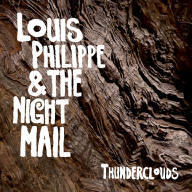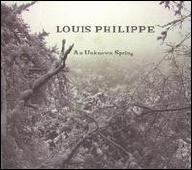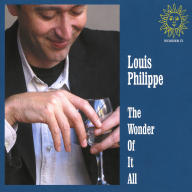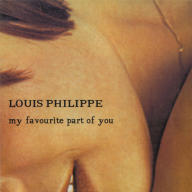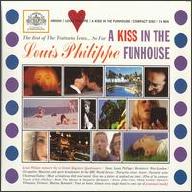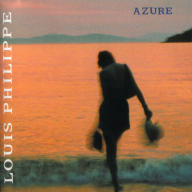Born Philippe Auclair in Normandy in 1959, he studied and taught philosophy in Paris before releasing his first EP as the Border Boys in 1985. Not long after that, he left France, and his subsequent band, the Arcadians, to pursue his dream of being a songwriter in the land that spawned his beloved Kinks. Like many French pop composers, he believed English to be the lingua franca of rock & roll and, thanks to an excellent English teacher and intensive study of Ray Davies' work, was soon writing lyrics that betrayed nary a trace of their author's origins.
It was Mike Alway who persuaded Auclair to change his name, in accordance with the él philosophy that all the label's artists should adopt exotic characters based upon their own personalities and backgrounds. The name Louis Philippe was chosen because the Auclair family's coat of arms turned out to be similar to that of King Louis Philippe d'Orléans, and because as the "king of the bourgeoisie" with nothing much to commend him, Alway and Auclair felt the name was bound to provoke a reaction among those humorless agents of the British indie rock world who hoped to bring down the Thatcher government with grim diatribes and grinding guitars.
Over two years, Philippe recorded three remarkably accomplished albums for él -- Appointment with Venus, Ivory Tower, and Yuri Gagarin -- as well as working as the label's in-house arranger/composer/session musician (including the Anthony Adverse album The Red Shoes -- which he composed and arranged from top to bottom). But many who discovered Philippe during this period were left baffled as he then seemed to vanish from the map. In fact, he was recording two albums -- the more playfully experimental Jean Renoir and Rainfall -- that initially secured release only in Japan, where Philippe had been astonished to find himself being hailed as a godfather of the so-called Tokyo "Shibuya sound" that spawned the likes of Cornelius and Pizzicato Five. Philippe's next two albums -- Delta Kiss and Sunshine -- were released through the short-lived Humbug label, and it was around this time that he looked like he would be scoring a hit in his native France with the single "L'Hiver Te Va Bien." But its success in becoming a Top 30 airplay hit failed to translate into actual record sales because, crucially, his French distributor had neglected to ensure that copies of the single were available in stores. By then, though, Philippe was finding himself in ever greater demand as an arranger, working with acts as diverse as P.J. Proby and Saint Etienne. A further important source of income was his work as a freelance sports reporter for organizations as diverse as BBC World Service and France Sport.
When Humbug disappeared in a puff of accountancy, however, it took the Bertrand Burgalat-produced Sunshine -- one of Philippe's most delightful and enduringly popular albums -- with it. Once more, Philippe was left stranded, until the él-inspired Spanish label Siesta stepped in to release his next album, Jackie Girl. This was followed by his most ambitious recording to date, Azure; released in 1998, it featured elaborate settings for a full symphony orchestra, yet while the likes of the Divine Comedy basked in critics' praise for attempting something similar, if arguably less successfully, Azure passed unnoticed. Further disappointment followed when Philippe played to a sold-out audience at the CMJ Music Marathon in New York to promote his first U.S. release -- the compilation A Kiss in the Funhouse -- and within weeks one of its songs was number one on the CMJ charts. But his distributors failed him yet again, and copies of the record were nowhere to be found.
After Azure, Philippe took the extraordinary step of recording an album of songs by the French composer Francis Poulenc, accompanied only by his long-term collaborator Danny Manners. Nusch was followed in 2002 by My Favourite Part of You, a return to more conventional recording methods for what turned out to be Philippe's most personal album to date. This also marked his first collaboration with the critically acclaimed British novelist Jonathan Coe, who provided lyrics for three songs, and with whom he also worked on the fusion of spoken word and music that was 9th 13th. Subsequently recovering from a debilitating illness, Philippe decided he no longer wanted to waste his energies on negotiating with record companies, so his next recording -- 2004's The Wonder of It All -- was funded entirely by fans via the Internet, and released on his own Wonder Records imprint. Again, the few reviews it did secure were unfailingly positive, yet the bulk of the British music press gave it the familiar cold shoulder. He continued to be in demand as an arranger, however, with younger bands like the Clientele bringing him on board for their highly successful Strange Geometry album.
There is no doubt that Philippe's reluctance to tour -- though he is an accomplished live performer -- or make videos has limited his chances of making any great impact on a mass audience. And perhaps his early years as a quasi-fictional character on a label that many critics had written off as a hotbed of mischief-making fops and dandies militated against his mature work being afforded the respect it deserved. When it comes to writing the kind of beautiful, flowing melodies that are commonly regarded as belonging to a golden age of popular music, though, Philippe has few contemporary peers. In 2006, as Philippe Auclair, he also became a published author in France with Le Royaume Enchanté de Tony Blair.
By the start of 2007, Philippe's name was attached to no less than four impressive new releases. Reprising his role as arranger and conductor for the Clientele's God Save the Clientele album, he had critics calling him out by name and reveling in the deft complexity of his arrangements. The two-CD set Live followed shortly after and gave many fans their first chance to hear the man perform an entire evening's program in a live, intimate setting. Recorded two years prior in London and Bremen, Germany, together with a couple of tracks taken from an earlier gig at the Spitz, London, Louis Philippe Live provided a sparsely adorned collection of classic Philippe selections, Brian Wilson covers, Francis Poulenc melodies, and a smattering of rarities.
Shifting gears slightly, after much work recovering from a studio break-in, Philippe finally put the polish on a project he'd started back in 1997 with longtime friend and collaborator Stuart Moxham (of Young Marble Giants fame). The result was the understated album The Huddle House, which found both parties at the top of their craft and reminded the world of the importance of Moxham's timeless songwriting, as well as Philippe's status as a potent collaborative force. In tandem with that joint project, Philippe somehow found the time to quietly release what was, quite possibly, the most representative album of his career, An Unknown Spring. Joined by the Clientele's Alasdair Maclean and Mel Draisey, as well as longtime cohorts Danny Manners, Bertrand Burgalat, and newcomer Mari Persen, the album featured some of the most tightly crafted material he'd ever recorded. After this banner year of multiple releases, Philippe shifted his focus back to his demanding career as a sportswriter.
The resulting musical hiatus stretched all the way into the late 2010s before a joint concert with a crack team known as the Night Mail inspired his next solo outing. Meanwhile, Philippe also resumed his collaboration with Moxham to record 2020's The Devil Laughs, their follow-up to 2007's The Huddle House. Simultaneously, he hired the Night Mail as a backing group to record Thunderclouds, an elegant live-in-the-studio set credited to Louis Philippe the Night Mail. It was released in December 2020. In late 2022, German imprint Tapete issued a curated anthology of some of Philippe's best work. Compiled and presented by longtime friend and occasional collaborator Sean O'Hagan, The Sunshine World of Louis Philippe included material recorded between 1994 and 2007. ~ Christopher Evans & J. Scott McClintock, Rovi




